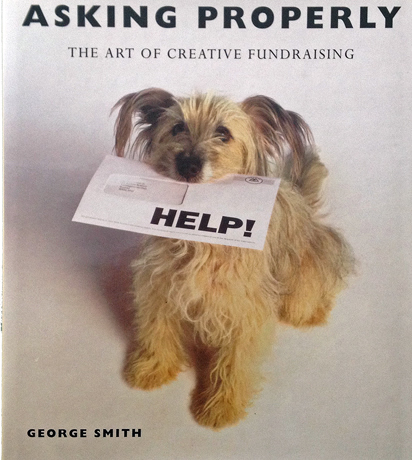Asking properly: the only sustainable way to do fundraising
Back in the mid 1990s when my business partner and buddy George Smith was deciding on a title for his then new and seminal book on creativity in fundraising I remember him being momentarily miffed that I’d already spoken for the ‘relationship’ word.
Then, as he pondered this, his eyes glowed. I could see instantly that he was about to trump me. ‘I shall call it, he announced with glee, ‘Asking Properly’!
And I thought, yes, of course. He has trumped me indeed. The title is perfect. That’s what fundraising really has to be all about.
Advertisement
Thus George presented to the world his classic text, Asking Properly: the art of creative fundraising. If any fundraiser worth his or her salt hasn’t actually got it on his or her desk or shelf the likelihood is she or he is re-reading it. Or whatever salt they think they’re worth won’t amount to much.
I wonder what George would make of today’s shenanigans. Not a lot, I’m sure. I expect he’d survey the national press and the myriad of online twitterings and pontificatings and say something like, ‘Well, what the **** did they expect?’ And maybe, ‘How did they get away with it for so long?’
George invariably preferred doing to talking, so he probably wouldn’t approve of setting up reviews, task forces or commissions. When something was evidently wrong, his solution would be, just do it again and this time do it right. Especially when what’s wrong is what George would call, ‘the bleedin’ obvious’.
Ah George. We need you now.
If any fundraiser worth his or her salt hasn’t actually got it on his or her desk or shelf the chances are she or he is re-reading it. Or whatever salt they they’re worth won’t amount to much.
At its best, fundraising is fabulous. Anyone with eyes and imagination can see that. Individual donors give far and away the largest part of all voluntary income and, in this world of need, make deep and lasting differences in a wondrous array of ways. The gentle art of promoting the joy of giving was how George saw fundraising. At its worst, fundraising today is dangerously far from that. You don’t have to read the Daily Mail, just ask some donors.
Asking properly is in essence delightfully simple. It hints that instead of over-inflating fundraising to an art or a science we might have been better to lay more stress on the basics and getting them right first, before aspiring to anything more complex.
Readers of the recent barrage of blogs from the likes of Giles Pegram, myself and several others – see side panel – will know there’ve been numerous calls for a serious overhaul of the donor experience, many from well before the Daily Mail sensed a story it could subvert. Our great sector is still bedevilled by short–term thinking, unjustifiable acquisition costs, falling retention rates, inappropriate language when talking about donors and quick fundraising fixes.
Would-be reformers believe there’s a golden prize to be had by whichever far-sighted fundraisers will be first to face up to the need to change, radically, how they do what they do.
At its best, fundraising is fabulous. Anyone with eyes and imagination can see that. Individuals donors give far and away the largest part of all voluntary income, and in this world of need make deep and lasting differences in a wondrous array of ways.
It’s past time, we’re sure, for our sector to take a long look at fundraisers and fundraising through the eyes of the donor, to ask what donors want and what is most likely to inspire them to give. Of course we already do a lot of things right, but let’s be clear about them and spread their practice till they’re universal.
Dramatically upgrading how donors connect with and interact with the charities they support, we think, would enhance the value and the benefits of the experience not just for all donors but for fundraisers too and for the causes they both serve.
Many changes could profitably flow from this initiative. But instead of listing them I’ll just quote an aspiration expressed neatly recently by a man not known for pulling his punches, America’s curmudgeonly guru of donor retention, Roger Craver.
Having defined our sector’s lingering dilemma as, ‘…lousy fundraising – neglect of or contempt for the donor…’ and pointing out it’s not unique to the UK, it’s the global norm, Roger goes on to say:
‘My hope is that we not miss the opportunity to get at the root of all this: our failure to involve, listen to and build true relationships with donors.’
Amen.
We have a dream
So, I guess, we have a dreamBut can we inspire the world with it? What’s needed now isn’t just some tinkering at the edges, it’s the hope of creating a much better way. Back at the beginning of this year I asked, what if we had the courage and vision to imagine a different world for donors?
Well, perhaps now we can.
And our Institute of Fundraising is the right organisation to take up and lead this process. They, understandably, have a lot on their plates right now. But busy as they are, they’ve responded to our call with interest and enthusiasm.
What’s being considered isn’t hugely complex. In summary, it’s this:
• Professional fundraisers should work together to define what the donor experience should be and enshrine it in best practice. By listening carefully, taking the donor’s view and putting our customers first, fundraisers will simply be following sound commercial practice and common sense. And – importantly – doing the right thing. So let’s elevate the process and give it some urgency. The objective is to find a way to define nothing short of a new paradigm, a new status quo where donors, not targets, are at the heart of fundraising endeavours and everything fundraisers write, say and do will reinforce to donors our mutual belief and shared experience – that being a donor to and working for a great cause are both simply brilliant.
Maybe even the term ‘professional fundraiser’ itself should be up for reconsideration…
Whatever, let’s hope that, led by our professional institute, we fundraisers can now organise and get cracking to make the most of this great opportunity and really bring to pass the transformational change that fundraising needs.
A selection of recent writings on the apparent malaise at the heart of fundraising follows, from both pre and post ‘The Olive Cooke affair’ (I’ve not bothered to include links to ‘Olive’s law’ and ‘fundraising-out-of-control’-type articles, but they can be found on the Internet, in volume).

Some of Giles Pegram’s relevant blogs:
• Seven things I’d have done differently if I were an appeals director now.
• If you want more money, stop asking for it.
• The state of relationship fundraising, part I.
• The state of relationship fundraising, part II.
• Why Oxfam’s Tim Hunter is my hero.
With power and passion Professor Adrian Sargeant adds his own call for action.
From across the Atlantic The Agitator’s been fulminating about the shortcomings of our profession, seeming to despair that we’ll ever get it right.
Ian MacQuillin at the Rogare think tank has had more than a few things to say about the media storm, here, and on the silence of the lambs (er, fundraisers). He includes the warning that a regulatory solution might be imposed on what is really an issue of culture and ethics.
Charlie Hulme at DonorVoice wonders here why this has taken us so long. And his company has written an open letter to fundraisers here about losing the headlines but keeping the donors. Charlie’s mega-series on SOFII, Forcing or forging a relationship, anticipated many of the current issues, and then some.
Mark Phillips of Bluefrog gives his take on what’s wrong with fundraising.
Richard ‘Haggis’ Turner, the ifundraiser, suggests we need to wake up to the new rules of fundraising.
Craig Linton, writing here as the Fundraising Detective, adds useful insights into the economics of today’s fundraising and their impact upon the donor experience.
So, clearly we have in our sector the talent and the passion to write powerfully and persuasively on how to right these wrongs. Let’s hope we have as much talent and passion to put the words into practice.
My own writings on this theme I’ve of course left till last.
The future of fundraising series. Part 1 appeared in November 2014 with part 5 published on 17th May 2015.
Introduction to the future of fundraising.
Why fundraising has to change
A fundraising Utopia
Three mega-opportunities for fundraisers
Marketing was a mistake.
Fundraising and the rule of law.
Anyone still without his or her own personal copy of the above classic is welcome to order it today. The picture of Dodger the dog you get as a bonus. George liked this image because, when asking, Dodger always wags his tail, looks enthusiastic and is never less than delightful.
Ken Burnett is well known as an author, lecturer and consultant on fundraising inspiration and communication for nonprofit organisations worldwide.
© Ken Burnett 2015
Republished with kind permission of Ken Burnett. This article was originally published at KenBurnett.com.





